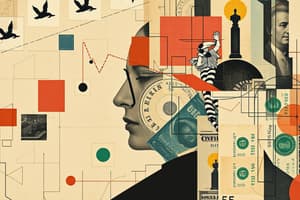Podcast
Questions and Answers
What function of money is exemplified when comparing the prices of a shirt and a pair of shoes at a department store?
What function of money is exemplified when comparing the prices of a shirt and a pair of shoes at a department store?
- Unit of account (correct)
- Store of value
- Barter system
- Medium of exchange
If money did not exist, which aspect would become extremely challenging according to the text?
If money did not exist, which aspect would become extremely challenging according to the text?
- Maintaining wealth over time
- Keeping track of debts accurately (correct)
- Comparing prices between different goods
- Valuing objects solely based on physical attributes
Why is money considered a reliable store of value according to the text?
Why is money considered a reliable store of value according to the text?
- It has intrinsic value like gold or silver
- It is always accepted for all transactions
- It can be easily converted into physical assets
- It maintains stability over time (correct)
What role does money play when individuals ensure that their purchasing power remains intact over time?
What role does money play when individuals ensure that their purchasing power remains intact over time?
Which function of money allows for seamless transactions in modern economies?
Which function of money allows for seamless transactions in modern economies?
Why is confidence in money's ability to preserve value considered critical to its success?
Why is confidence in money's ability to preserve value considered critical to its success?
What is the primary function of money described as a 'medium of exchange'?
What is the primary function of money described as a 'medium of exchange'?
Why are barter systems considered cumbersome compared to monetary exchanges?
Why are barter systems considered cumbersome compared to monetary exchanges?
What is the main purpose of money as a 'unit of account'?
What is the main purpose of money as a 'unit of account'?
How does the unit of account function simplify economic activities?
How does the unit of account function simplify economic activities?
Which function of money ensures that it can be used as a 'store of value'?
Which function of money ensures that it can be used as a 'store of value'?
Why is using currency or debit cards preferred over direct bartering in transactions?
Why is using currency or debit cards preferred over direct bartering in transactions?
Flashcards are hidden until you start studying
Study Notes
Money is a fundamental component of our modern society, serving various important functions that help us conduct transactions, manage wealth, and facilitate economic activities. Three primary roles of money—medium of exchange, unit of account, and store of value—are essential building blocks of its role in human economies. Let's delve into each function to better understand their significance.
Medium of Exchange: This function refers to how money facilitates trade by enabling individuals to conveniently buy goods and services from others without the need to directly barter with one another. Imagine trying to purchase bread using apples instead of dollars; this would be an example of bartering. With a common medium of exchange such as currency, however, you can easily pay for your loaf of bread with cash or debit card, making these transactions straightforward and efficient. Barter systems remain cumbersome because they involve two parties agreeing upon an equivalent value between items traded, whereas monetary exchanges eliminate this complexity.
Unit of Account: As the name implies, the second key role of money allows it to serve as a standard measure for all economic values within a given economy. A unit of account simplifies pricing, comparing the worthiness of different products, and establishing debt repayment terms. For instance, when we see prices listed as $20 for a shirt and $69.99 for a pair of shoes at a department store, both purchases can be compared based on a shared metric – dollars. Without money as a unit of account, valuing objects and keeping track of debts across a diverse array of commodities would become extremely challenging.
Store of Value: Finally, and perhaps most importantly, money serves as a reliable means for storing wealth over time. By holding onto units of money, people ensure that their purchasing power remains intact rather than relying solely on physical assets like land or livestock. Stores of value must maintain stability, allowing individuals to save resources while trusting that their accumulated wealth will continue to hold meaning against future market fluctuations. This confidence in money's ability to preserve value is critical to its success as a well-functioning instrument within any economy.
These three distinct yet interconnected elements – medium of exchange, unit of account, and store of value – combine to give money its indispensable status in modern societies. Understanding these core functions provides insight into how money fosters growth and development through seamless transactions, valuation, and savings, thereby laying the groundwork for more advanced financial concepts and economic theories.
Studying That Suits You
Use AI to generate personalized quizzes and flashcards to suit your learning preferences.




